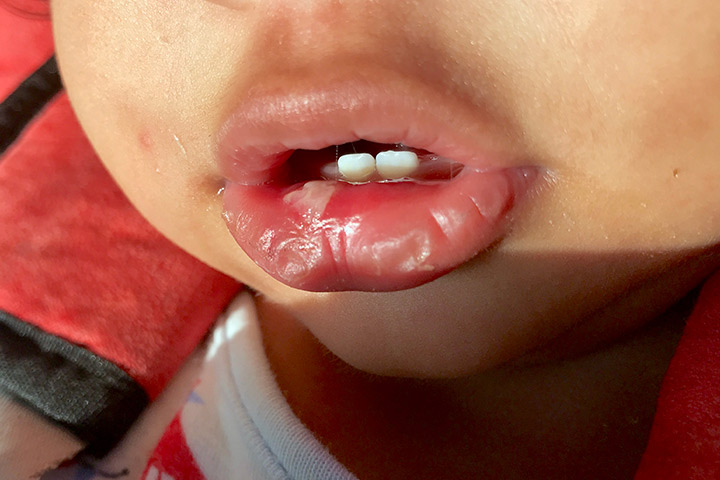Mouth ulcers in babies are common and usually clear up on their own. They are small and painful sores that appear on either the inside of the lips, cheeks, and tongue or on the floor of the mouth (1). A study by the University Children’s Hospital of Basel detailed that oral ulcers are prevalent among 9% of children. Having an ulcer can be a painful experience and make the baby cranky. They also give rise to irritation while trying to feed them. Although ulcers are not a serious cause for concern, if the pain and irritation persist and affect the quality of life of your baby, consult your doctor immediately. Read on to know more about the causes, signs, treatment, and prevention of mouth ulcers in babies.
How To Identify Mouth Ulcers?
Mouth ulcers in babies exhibit the following typical symptoms (2).
- A lesioniXAbnormality in a tissue of the organism due to physical harm or a disease or a sore with well-defined boundaries.
- The center of the lesion is likely to be yellow or gray when compared to the surrounding tissue.
- The ulcer may have a red outline.
- A mouth ulcer is often tender to touch.
- There could be redness on the ulcer, and it might occasionally bleed.
- Babies could exhibit excessive drooling due to an ulcer.
The baby or toddler might have reduced appetite as it would hurt whenever they try to eat and drink.
If you have a doubt about the presence of ulcers in your baby’s mouth, see a pediatrician for an examination.
What Causes Mouth Ulcers In Babies And Toddlers?
Mouth ulcers in babies and toddlers may be caused due to various reasons. Here are a few of the common reasons (1).
- Herpes simplex virus (cold sore virus): These ulcers are usually seen in the age group of one to three years. Clusters of up to ten or more ulcers occur together on gums, tongue, and lips. Ulcers are also seen around lips and mouth. They are often accompanied by fever and difficulty in swallowing (1). Read more about herpes simplex virus.iXA virus causing contagious (cold) sores, often around the genitals or the mouth
- Canker sores: A type of ulcer commonly seen in babies and toddlers, they are also known as aphthous ulcers or aphthous stomatitis (3). There are a variety of reasons to cause this type of sores. Read more about canker soresiXNon-contagious painful sores inside the mouth.
- Oral thrush: The candida InfectioniXInfection caused by fungal species named Candida albicans, usually affecting the skin and mucous membrane of the oral cavity can cause inflammation, which may result in white-colored ulcers on the inner lips, gums, palate, and tongue (4). Read more about oral thrush.
- Inflammatory bowel diseases: It is a group of chronic inflammatory diseases of the intestine. Oral ulcers are among the several symptoms of the disease (5).
- Local injury: Traumatic ulcers could also happen due to an injury from objects like a toothbrush, teether, toy, etc.
- Allergic reactions: Allergies to foods might also lead to the development of mouth ulcers. Food allergies are more likely to be a cause among toddlers than in babies.
- Hematinic (blood-related) deficiencies: Deficiency of iron, folate, vitamin B12, vitamin B6, and some other micronutrients in the body (6) (7) could result in ulcers.
- Malabsorption of nutrients: Malabsorption refers to decreased intestinal absorption of vital nutrients. Poor malabsorption could lead to nutritional deficiencies, which could eventually lead to mouth ulcers.
- Immune system disorders: Problems with the immune system, like immunodeficiency and autoimmunity, might also cause mouth ulcers.
- Family history: Babies and toddlers with a family history of canker sores are at a higher risk of developing the sores (1).
Aggressive sucking on a pacifier can cause oral sores. But they are minor and go away when the child stops relying on the pacifier.
Does Teething Cause Mouth Ulcers In Babies?
Teething usually causes swollen gums rather than ulcers. But teething might cause ulcers if the baby bites the inside of the cheek or lips to soothe the irritated gums. The ulcer is likely to go away if the baby is given teethers, and when the teething is completed.
Dr. Frank Farrelly, a dentist from Sydney, Australia, says, “Usually teething does not cause ulcers, but the area over the erupting tooth can be mildly tender. Biting down on thin tissue just prior to eruption can trigger an ulcer due to the sharp tooth underneath, but it is not common, nor does any measure needs to be taken to avoid it.”
Home Remedies For Mouth Ulcers In Babies And Toddlers
Mouth ulcers are usually not serious and may be treated at home. Undermentioned are some of the anecdotal home remedies that have been in use for years. However, never try any home remedy for babies below the age of six months.
If your baby is older than six months and you wish to use a home remedy, then consult a doctor. Below are some of the common home remedies used for mouth ulcers.
- Turmeric: As turmeric is known to possess anti-inflammatory, antiseptic, and antibacterial properties, it is believed to be useful in giving relief from ulcers.
- Coconut oil: Lauric acid in coconut is said to be effective in healing mouth ulcers. However, its efficacy and safety in babies is under-researched (8).
- Yogurt: Yogurt and buttermilk soothe the ulcers and provide relief to the baby.
- Holy basil: Holy basil is said to be effective in healing mouth ulcers (9).
- Ghee: Ghee (clarified butter) has been traditionally used in India for providing relief from ulcers.
- Honey: Honey has soothing properties. But do notgive honey to babies below the age of 12 months since it may cause botulismiXA serious food poisoning caused by toxins produced by the bacterium Clostridium botulinum (10).
- Aloe vera: The pulp and the juice of aloe vera might be helpful in soothing the irritated tissue. However, do not use it without talking to a pediatrician.
Ulcers heal in a few days and are usually not a reason to worry.
When To Go To The Doctor?
If you see any of these symptoms along with ulcers, contact your pediatrician (11).
- Fever
- Recurrent ulcers
- Ulcers that worsen and don’t heal for more than two weeks
- Weight loss
- Stomach pain
- Ulcers around buttocks (along with mouth ulcers)
- Ulcers seen on outer lips too
- Swelling of the face or lymph node (sides of the neck)
Treatment For Mouth Ulcers In Babies And Toddlers
Treatment depends on the severity of the ulcers, age of the baby, and the general health of the baby. The doctor may prescribe one of the following treatment methods (12).
- Application of topical ointments containing local anesthetic agents to alleviate the symptoms.
- Medicines like acetaminophen or ibuprofen to help with the pain.
- Mouthwashes might be advised for toddlers to help with the ulcers.
- If the ulcers occurred due to a viral infection like herpes simplex virus, the doctor might suggest an antiviral medication in some severe cases and in an immunodeficient patient.
Never give any medication, including over-the-counter drugs, to a baby or a toddler without consulting a doctor.
What To Feed A Baby With Mouth Ulcers?
Food is likely to irritate mouth ulcers, thus making the baby cranky while also reducing their appetite. Below are some options for feeding a baby.
- If your baby is below the age of six months, continue breastfeeding or formula feeding. These are safe and are easy on the mouth.
- If your baby has trouble bottle-feeding, you may spoon-feed the baby expressed breast milk and formula.
- If your baby already consumes solid food, then include semi-solid food and food with a liquid consistency. You can feed broth and purees that do not require chewing. Offer a straw to the toddler if they cannot sip due to pain.
- Soft food, like boiled vegetables, mashed potatoes, and cereals with formula or milk are good option
- Eating cold food like milkshakes, popsicles, and slushes can help soothe the irritation of mouth ulcers in toddlers.
- Avoid offering salty, spicy, and tangy food that might sting and hurt a mouth ulcer.
How To Reduce The Risk Of Mouth Ulcers?
Ulcers cannot always be avoided. However, observing a few precautions might help reduce the risk of developing ulcers and related discomfort.
- Maintain proper hygiene, especially oral hygiene. Family members with mouth ulcers and sores on the body should avoid contact with the baby.
- Avoid recurrent trauma from a toy, teether, or a toothbrush.
- If your baby is known to have allergies or a chronic illness, then managing them will help avoid ulcers.
- Feed the baby a wholesome diet.
Mouth ulcers in infants are seldom a concerning condition. Besides the irritation and slightly painful sores, the condition should not pose any threat to the baby. If your baby is older than six months, you may try managing the condition with some home remedies. However, you should consult your child’s doctor before using any measure to ensure safety. The doctor will suggest appropriate and effective treatment that may mostly include ointments and medications. If the common symptoms are accompanied by any concerning symptoms such as fever, swollen face, or stomach pain, consult the doctor immediately.
Key Pointers
- Mouth ulcers are red sores with a yellow or gray center that occur inside the mouth, and they usually resolve without treatment.
- Canker sores, oral thrush, allergies, and immune system disorders can cause mouth ulcers.
- It is recommended to consult a pediatrician if they are persistent or accompanied by additional symptoms such as fever, pain, swelling, or ulcers on other parts of the body.
- Doctors may prescribe painkillers, topical ointments, and mouthwashes to treat mouth ulcers in babies.
- Home remedies such as turmeric, coconut oil, basil, ghee, and honey can also help treat mouth ulcers.
- Following proper oral hygiene and a nutritious diet may help reduce the risk of mouth ulcers.











